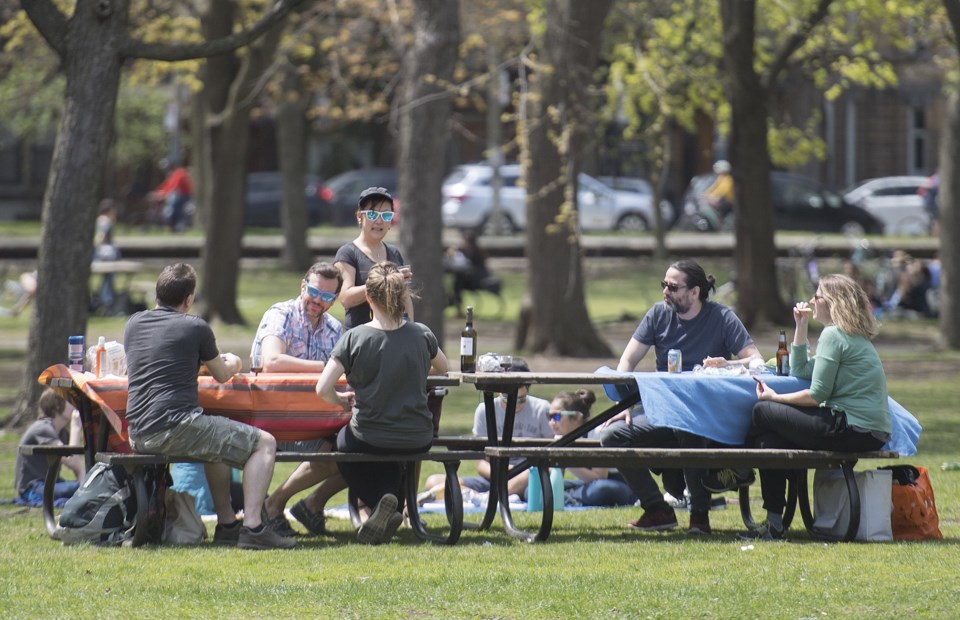Shopping at a local boutique, dining on a restaurant patio, taking a stroll through a park on a sunny afternoon.
The normally trivial decisions we make about everyday activities are becoming more significant as society begins to reopen following months of shutdown during the COVID-19 pandemic.
There are overarching questions attached to our decisions now — what's the risk? And how do we calculate it?
Experts in psychology and risk analysis say that while our decision-making process is the same as it was before the pandemic hit, COVID-19 is forcing us to evaluate our choices in a much more deliberate way.
"One of the elements of our risk perception is driven by what's currently occupying our attention," said Derek Koehler, a psychology professor at the University of Waterloo. "And right now, COVID-19 is everywhere. It's really the only thing we're thinking about and talking about.
"So that's heightening our senses that these activities are now suddenly risky."
The physical signals of the pandemic are inescapable too, Koehler said.
People wearing face masks in public, physical distancing markers on grocery store floors and clerks behind Plexiglas barriers all serve as reminders of the risk associated with everyday life — at least for now.
Koehler expects our reaction to those signals to change as we get more used to them, just as we grew accustomed to added security measures in airports after the 9-11 terrorist attacks.
"These signs in our environment are triggering our system, saying that there's something unfamiliar here," Koehler said. "And unfamiliar stuff tends to feel scary."
Dale Griffin, a professor of marketing and behavioural science at the University of British Columbia, says our basis for determining risk has also shifted since the pandemic started.
Decisions previously explained by function — how much time we have to do a specific activity, how much it costs — are now made with safety as the ultimate focus.
But how do we determine what's safe?
Griffin said our perceptions are shaped by what we see. And we assess risk in our scenarios by seeking "comparable examples" from others.
"For most people, the evidence they bring to mind, the analogies they bring to mind come from what they're seeing in the media," Griffin said. "Are they seeing crowded emergency rooms in New York? Are they seeing busy shoppers in Tennessee? Are they hearing from their friends about someone's grandmother who died?
"So those pieces of evidence intuitively are what we have to pull into our decision-making."
This can be harmful during the age of social media, Griffin said, when it can be difficult to separate fact from theory.
"We can only decide on risk on the basis of the evidence we can bring to our mind, and that's going to be very dependent on what kind of media we watch and what kind of stories we've heard from other people," he said.
Koehler, whose research focuses on assessment of uncertainty in everyday planning, says there are two sides to decision-making: "the thinking side, and the feeling side."
The thinking side is where we gather facts and evidence to make a rational judgment, determining consequences and the probability of a bad outcome.
The feeling side, meanwhile, is our emotional response when faced with different risks.
"And that plays a big role as well," Koehler said. "I think we're all kind of familiar with that."
Koehler described the feeling side as "more about preferences and values — and how important to us these different things are."
That could help explain why some people have been seemingly defying the rules of physical distancing over the last 10 weeks. While most appear to have taken a cautious approach, others might have disagreed with the level of risk in the first place and determined the "cost of their social isolation" to be too high, Koehler said.
For those who have abided by physical distancing measures since March, Griffin believes some may be experiencing a "fatigue factor" that could sway their decision-making processes.
After weeks of being cautious, they're simply tired of the constant risk assessment. Others, meanwhile, will continue to adhere to safety measures even after they've been relaxed.
"There's been this hypothesis of a psychological fatigue from thinking about risk ... and how long would distancing and isolation actually manage under those fatiguing circumstances?" Griffin said. "For a segment of society anyway, we've hit that point and we see people rushing to beaches, rushing to parks, and we see that not all the policy recommendations are being followed anymore.
"So I think in an oversimplified way we're going to see a world of three groups from now on: those that rush out due to fatigue, those that cling to their islands of safety, and a middle group — that's probably the majority — that's going to be guided by public policy advice."
This report by The Canadian Press was first published May 22, 2020.
Melissa Couto, The Canadian Press



